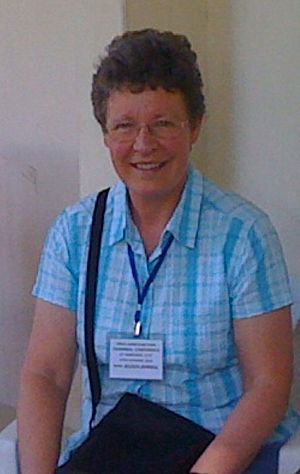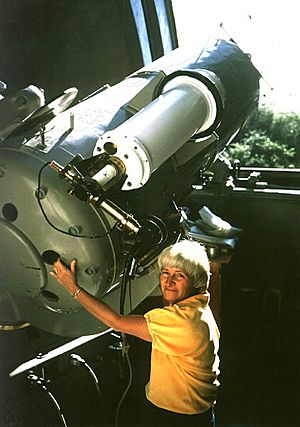List of women astronomers facts for kids
This article is about amazing women who have made huge contributions to the field of astronomy! For a long time, astronomy was mostly seen as a job for men. But many brilliant women worked hard, often behind the scenes, to help us understand the universe better. They studied everything from tiny asteroids to giant galaxies, and even helped discover new planets and stars.
| Top - 0-9 A B C D E F G H I J K L M N O P Q R S T U V W X Y Z |
Trailblazing Women in Astronomy
Astronomers Starting with A
- Madge Adam (1912–2001): An English astronomer who studied the Sun.
- Maggie Aderin-Pocock (born 1968): A British space scientist and TV presenter who makes science fun for everyone.
- Conny Aerts (born 1966): A Belgian astrophysicist who specializes in asteroseismology, which is like studying the "heartbeat" of stars to learn about their insides.
- Aglaonike (around 1st or 2nd Century BCE): An ancient Greek astronomer who was famous for being able to predict lunar eclipses.
- Anja Cetti Andersen (born 1965): A Danish astronomer who focuses on cosmic dust, which are tiny particles floating in space that help form stars and planets.
Astronomers Starting with B
- Neta Bahcall (born 1942): An Israeli astrophysicist who studies dark matter, a mysterious substance that makes up a big part of our universe but can't be seen directly.
- Natalie Batalha (born 1966): An American astronomer who played a key role in the Kepler mission, which discovered thousands of planets outside our solar system.
- Jocelyn Bell Burnell (born 1943): An Irish radio astronomer who, as a student, helped discover the first pulsars. Pulsars are super dense, spinning stars that send out beams of radio waves.
- Margaret Burbidge (1919–2020): A British-American astronomer and astrophysicist who studied how elements are made inside stars. She was also the first woman to be director of the Royal Greenwich Observatory.
Astronomers Starting with C
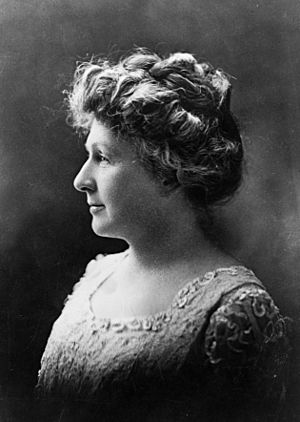
Annie Jump Cannon 1922 Portrait
- Annie Jump Cannon (1863−1941): An American astronomer who was incredibly good at classifying stars based on their light. She cataloged hundreds of thousands of stars, which helped us understand them better.
- Catherine Cesarsky (born 1943): An Argentinian–French astrophysicist who has led major astronomy organizations, including the European Southern Observatory.
- Merieme Chadid (born 1969): A Moroccan-French astronomer who has done research in extreme places like Antarctica.
- Agnes Mary Clerke (1842–1907): An Irish astronomer and author who wrote popular books explaining astronomy to the public.
- France A. Córdova (born 1947): An American astrophysicist who has held many important leadership roles, including director of the National Science Foundation.
Astronomers Starting with D
- Ruth Agnes Daly: An American astrophysicist who studies black holes and how they affect the galaxies around them.
- Ewine van Dishoeck (born 1955): A Dutch astrochemist who studies molecules in space, helping us understand how stars and planets form.
- Jo Dunkley (1979/1980): A British cosmologist who studies the early universe and the cosmic microwave background, which is like an echo from the Big Bang.
Astronomers Starting with F
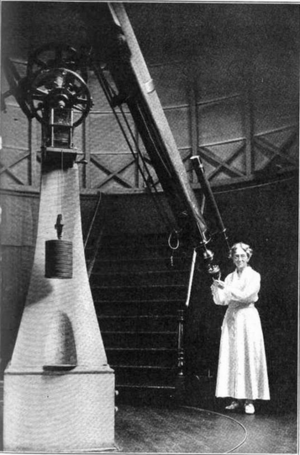
Caroline Furness (1918)
- Sandra Faber (born 1944): An American astrophysicist who studies how galaxies form and change over time. She helped develop important theories about dark matter.
- Laura Ferrarese: An Italian astronomer who studies supermassive black holes, which are giant black holes found at the center of most galaxies.
- Debra Fischer: An American astronomer who searches for planets outside our solar system.
- Williamina Fleming (1857–1911): A Scottish astronomer who worked at Harvard College Observatory. She discovered many stars and nebulae, including the Horsehead Nebula.
- Wendy Freedman (born 1957): A Canadian-American astronomer who has made important measurements of the universe's expansion rate.
Astronomers Starting with G
- Pamela L. Gay (born 1973): An American astronomer, educator, and writer who is well-known for making astronomy accessible through podcasts and online projects.
- Margaret Geller (born 1947): An American astrophysicist who studies the large-scale structure of the universe, mapping out how galaxies are arranged in giant cosmic webs.
- Andrea M. Ghez (born 1965): An American astronomer and Nobel Prize winner who proved that a supermassive black hole exists at the center of our own Milky Way galaxy.
- Eva Grebel: A German astronomer who studies star populations and how galaxies form.
Astronomers Starting with H
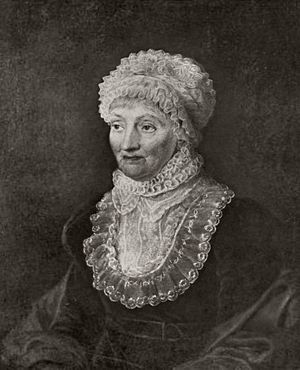
Caroline Herschel (1750–1848)
- Margherita Hack: An Italian astrophysicist who was the first woman to direct the Trieste Observatory in Italy.
- Heidi Hammel (born 1960): An American planetary scientist who studies the planets in our solar system, especially Neptune and Uranus, using the Hubble Space Telescope.
- Caroline Herschel (1750–1848): A German astronomer who was the sister of famous astronomer William Herschel. She discovered several comets and helped her brother with his observations.
- Jacqueline Hewitt (born 1958): An American astrophysicist who discovered the first Einstein Ring, a phenomenon where light from a distant galaxy is bent by a closer galaxy, creating a ring shape.
- Helen Sawyer Hogg (1905–1993): An American-Canadian astronomer who studied variable stars in globular clusters, which are tight groups of very old stars.
- Hypatia (c. 350–370 to 415): An ancient Greek philosopher, astronomer, and mathematician who taught in Alexandria, Egypt.
Astronomers Starting with J
- Carole Jordan (born 1941): An English physicist and astrophysicist who studies the Sun and other stars.
Astronomers Starting with K
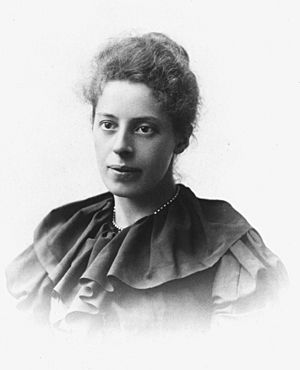
Dorothea Klumpke (1861–1942)
- Vicky Kalogera: A Greek astrophysicist who studies gravitational waves and neutron stars.
- Victoria Kaspi (born 1967): An American-Canadian astrophysicist who studies pulsars and magnetars, which are super magnetic neutron stars.
- Maria Margarethe Kirch (1670–1720): A German astronomer who was one of the first women to discover a comet.
- Dorothea Klumpke (1861–1942): An American astronomer who studied star clusters and helped create a huge photographic map of the sky.
Astronomers Starting with L
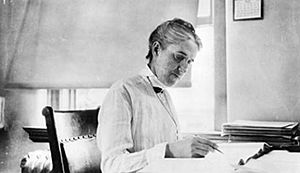
Henrietta Swan Leavitt (1868–1921)
- Henrietta Swan Leavitt (1868–1921): An American astronomer who discovered a way to measure distances in space using variable stars. Her work was crucial for understanding the size of the universe.
- Nicole-Reine Lepaute (1723–1788): A French astronomer and mathematician who helped calculate the return of Halley's Comet.
- Jane Luu (born 1963): A Vietnamese–American astronomer who co-discovered the first objects in the Kuiper belt, a region of icy bodies beyond Neptune.
Astronomers Starting with M
- Amy Mainzer (born 1974): An American astronomer who specializes in infrared astronomy and building instruments to study asteroids and comets.
- Janet Akyüz Mattei (1943–2004): A Turkish-American astronomer who studied variable stars and led the American Association of Variable Star Observers.
- Antonia Maury (1866–1952): An American astronomer who developed an important system for classifying stars based on their spectra (the light they give off).
- Maria Mitchell (1818–1889): An American astronomer and the first professional female astronomer in the United States. She discovered a comet and was a professor at Vassar College.
- Linda A. Morabito (born 1953): An American planetary scientist who discovered active volcanoes on Io, one of Jupiter's moons.
Astronomers Starting with N
- Joan Najita: An American astronomer who researches how stars and planetary systems form and change over time.
- Heidi Jo Newberg: An American astrophysicist who studies the structure of our own Milky Way galaxy.
Astronomers Starting with O
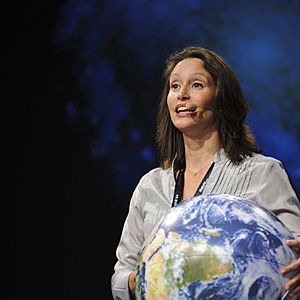
Carolina Ödman-Govender in 2013.
- Carolina Ödman-Govender (1974–2022): A Swiss astrophysicist who was passionate about making astronomy accessible to people in developing countries.
- Feryal Özel (born 1975): A Turkish astrophysicist who studies stellar remnants like black holes and neutron stars.
Astronomers Starting with P
- Cecilia Payne-Gaposchkin (1900–1979): A British-born American astrophysicist who, in her PhD thesis, correctly figured out that stars are mostly made of hydrogen and helium.
- Carolyn Porco (born 1953): An American planetary scientist who has worked on several NASA missions, including Voyager and Cassini, taking amazing pictures of planets and moons.
Astronomers Starting with Q
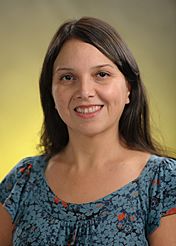
Elisa Quintana in 2014
- Elisa Quintana: An American planetary scientist who has discovered several exoplanets, including one that might be similar to Earth.
Astronomers Starting with R
- Nancy Roman (1925–2018): An American astronomer known as the "Mother of Hubble" because of her important role in planning the Hubble Space Telescope.
- Vera Rubin (1928–2016): An American astronomer who provided strong evidence for the existence of dark matter by studying how galaxies rotate.
Astronomers Starting with S
- Sara Seager (born 1971): A Canadian-American astronomer and planetary scientist who is a leading expert in finding and studying exoplanets.
- Carolyn S. Shoemaker (born 1929): An American astronomer who, along with her husband, discovered many comets and asteroids, including Comet Shoemaker–Levy 9 which famously hit Jupiter.
- Charlotte Moore Sitterly (1898–1990): An American astronomer who studied the light from stars and helped us understand their chemical makeup.
- Mary Somerville (1780–1872): A Scottish scientist and writer who was a brilliant self-taught astronomer and mathematician.
Astronomers Starting with T
- Jill Tarter (born 1944): An American astronomer who focuses on SETI (Search for Extraterrestrial Intelligence), listening for signals from other civilizations in space.
- Michelle Thaller (born 1969): An American astronomer and educator who works at NASA and is great at explaining science to the public.
- Beatrice Tinsley (1941–1981): A British-born New Zealand astronomer who made important discoveries about how galaxies evolve and change over time.
Astronomers Starting with U
- Meg Urry: An American astrophysicist who studies supermassive black holes and how they interact with the galaxies they live in.
Astronomers Starting with V
- Faith Vilas: An American planetary scientist who studies the surfaces of asteroids and other small bodies in our solar system.
Astronomers Starting with W
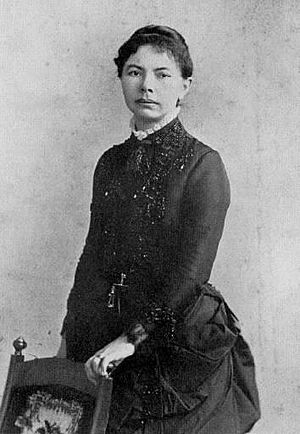
Sarah Frances Whiting (1847–1927)
- Wang Zhenyi (1768–1797): A Chinese astronomer, mathematician, and poet who explained how eclipses work and studied the movement of celestial bodies.
- Sarah Frances Whiting (1847–1927): An American physicist and astronomer who founded the astronomy department at Wellesley College.
- Jennifer Wiseman: An American astrophysicist who studies star formation and works on science outreach for NASA.
Astronomers Starting with Y
- Ye Shuhua (born 1927): A Chinese astronomer who has led important astronomy projects in China.
Astronomers Starting with Z
- Maria Zuber (born 1958): An American planetary scientist who has worked on many NASA missions to map the surfaces of planets and moons, including the Moon and Mars.
See also
- List of astronomers
- List of astronomical instrument makers
- List of French astronomers
- List of Russian astronomers and astrophysicists
- Annie Jump Cannon Award in Astronomy
Black History Month on Kiddle
Famous African-American Scientists:
 | Charles R. Drew |
 | Benjamin Banneker |
 | Jane C. Wright |
 | Roger Arliner Young |

All content from Kiddle encyclopedia articles (including the article images and facts) can be freely used under Attribution-ShareAlike license, unless stated otherwise. Cite this article:
List of women astronomers Facts for Kids. Kiddle Encyclopedia.

